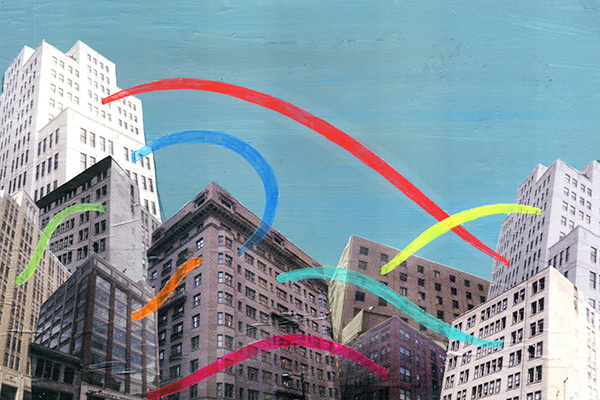At about 7.30am last Thursday I heard a tentative knock on my front door.
Standing on my doorstep, shivering in pyjamas and with a look of acute embarrassment on her face, was my new neighbour Carolina* from the studio flat downstairs. Her bathroom is across the hall from her flat, and she’d managed to lock herself out after going to the toilet without her keys. Critically, she had also managed to lock her keys and phone inside her flat, and was stranded in the stairwell.
I gave her my phone so she could call her office to explain that she’d be late. We have the same landlord so I called him to explain the situation, and invited her inside to wait while he drove a spare key over from Essex. I had to leave for work, but my girlfriend had a day off and so sat with Carolina for the next couple of hours and made her breakfast and tea. They chatted. They got along quite well.
The situation had initially felt all the more bizarre and awkward given that I’d only moved into the building that weekend, and had met her before this only once, as I was carrying furniture up the stairs on my moving day. I've lived in buildings before where I never spoke to - or even saw - my neighbours, but given that I now work on the RSA's Connected Communities programme I thought I'd make an effort to practice what we preach, and made sure I chatted her when I spotted her. We didn’t speak about anything hugely exciting on that occasion – essentially we told each other our names and said hello – and it didn’t feel particularly important at the time. But how long would she have sat helplessly panicking in the hallway on Thursday if we had not bumped into each other and exchanged small talk earlier that week? Would she have knocked on my front door when she did, or would it have seemed too difficult to inconvenience somebody she had never met before in such an embarrassing situation?
This is partly what the founder of the Big Lunch, Tim Smit, means when he says that ‘Small talk is in fact ‘big talk’ – it’s the code or tool which enables us to overcome our shyness’. The Big Lunch have published research this month that they say shows that ‘the chattiest streets are the happiest streets’, with seven in ten people surveyed saying that simple conversations with their neighbours make them feel more in touch with their community – but with one in twenty reporting that they have never spoken to their neighbours at all. This is worrying because not having these kind of local connections might not just make us less happy - or leave us caught short when we forget our keys - but it can be highly damaging to our health as well.
Last week, the writer Will Storr wrote in the Guardian about his own reluctance to talk to the people around him, and about how he is trying to change this. Contrary to the popular image of British villagers coming together at times of adversity, he recounts being rude to an environment officer and having an argument with a neighbour who wanted to borrow sandbags during the recent flooding in Somerset where he lives. Prompted by these negative interactions he decides to learn more about loneliness and is told by a genome biologist that isolation has a similar mortality risk to smoking , and so he decides to make a conscious attempt at being friendlier to his neighbours:
‘That evening, the man fails to return my sandbags. I wonder if he might have done had I responded to him differently. Worried about the flood, which is now just steps from my door, I walk around the corner to find them being used to corral a stream of water into a bubbling drain. Under the irritated gaze of the affected homeowner, I lug them back, one by one. Then I stop and return. With a smile and an apology, I explain who I am and why I need them. We have a chat. As it turns out, he's quite nice.’
This friendly small talk between people who live near each other are the kind of interactions that Talk To Me London, a new campaign group in the capital, want to see more of. It’s a simple aim, but we think it’s an important one and that’s why we worked with them to pilot their approach in south east London, and why we’ll be supporting them to raise funds for a city-wide launch on the RSA-curated section on the Kickstarter crowdfunding website. Watch out for that and get updates by following @talktomelondon on Twitter.
When I went back to my flat after work a few evenings ago, Carolina had left a little box of chocolates for my girlfriend and me as a thank you. Where in other places I have lived my neighbours have been strangers, now I have some form of connection with Carolina. We’ll look out for each other now and, who knows, maybe become friends. We might support each other in any future tenancy disputes about the building or the landlord. We might hit some bars to explore our new neighbourhood together. Or we might just keep a spare key for her in case she gets locked out again.
*Not her real name.
Related articles
-
Blog: Person-to-person social justice - where new and old power combine
Anthony Painter
The balance of power between people working together and old hierarchies is changing. Anthony Painter shows how and contends that we should start looking at society and politics in new ways.
-
Central heating for kids, community learning for everyone
A popular brand of cereal was once accompanied by the slogan “central heating for kids”. In the television advertisements (which have become something of a classic) children leave the house with an uncanny red glow, the visual token of the benefits of a good breakfast.



Be the first to write a comment
Comments
Please login to post a comment or reply
Don't have an account? Click here to register.